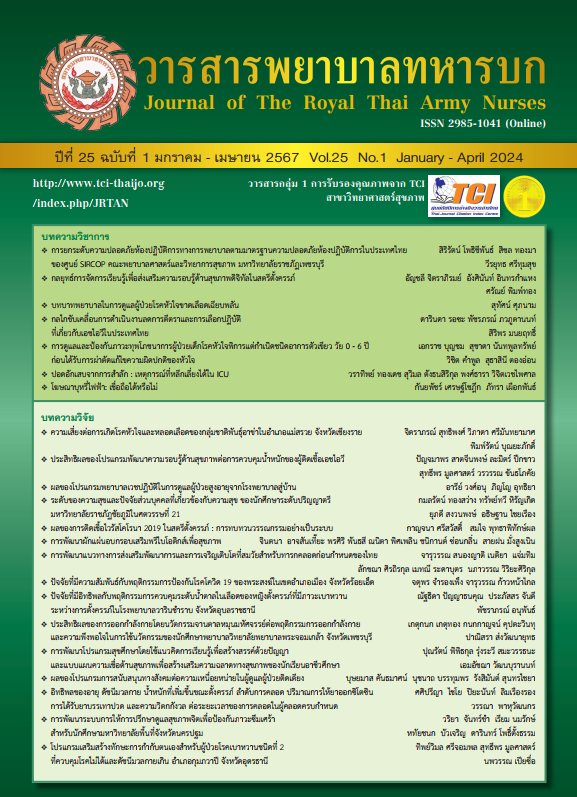The Effect of Brain, Mind, and Learning Program combined with Zumba Exercise Training on Executive Functions of the Brain among 10th Grade Students
Keywords:
Brain, Mind, and Learning Program, Executive functions, Zumba exercise trainingAbstract
This research was a quasi - experimental research. It aimed to study the effect of brain, mind, and learning program with Zumba exercise training on executive functions of the brain among 10th grade students. The samples, 52 10th grade students, were randomly assigned to either the experimental group or the control group (26 for each group) by matching the executive functions scores using the Executive Function Self Evaluate Report (EFSER). The research instruments were 1) EFSER 2) brain, mind, and learning program combined with Zumba exercises developed by the researcher. The program consisted of 9 sessions, lasted for 60 minutes for each session. The outcomes were measured at 3 time points for analysis: pre-test, post-test, and follow-up phases. The data were analyzed by a repeated-measures analysis of variance and paireddifferent test by Bonferroni method. The results showed that 1) The executive functions of the brain of students in the experimental group were higher than the control group in the post-test phase with statistically significant differences at the .05 level, 2) The executive functions of the brain of students in the experimental group were higher than the control group in the follow-up phase with statistically significant differences at the .05 level, 3) The experimental group had executive functions of the brain in the post-test phase higher than in the pre-test period with statistical significant differences at the .05 level, and 4) The executive functions of the brain of students in the experimental group in the follow-up period and the pre-experimental period were not statistically significant difference.
Downloads
References
Siripornpanich V. Covid-19 virus crisis with the missing opportunity of the child. Thai Health Promotion Journal. 2021; 30(3), 427-37.
Miller, E. K., Freedman, D. J., & Wallis, J. D. The prefrontal cortex: categories, concepts and cognition. Philosophical Transactions of the Royal Society of London. Series B: Biological Sciences. 2002; 357(1424), 1123-36.
Moffitt T. E., Arseneault L., Belsky D., Dickson N., Hancox R. J., Harrington H., . . .Caspi, A. A gradient of childhood self-control predicts health, wealth, and public safety. Proceedings of the National Academy of Sciences. 2011; 108(7), 2693-98.
Haenjohn J. A development of executive functions of the brain of adolescent by integrative learning modules. Journal of Faculty of Education, Burapha University. 2017; 28(2): 130-44. (In Thai)
Haenjohn J. Cognitive psychology. 2nded. Bangkok: Grandpoint; 2019. (In Thai)
Diamond A. Activities and Programs That Improve Children’s Executive Functions. Psychological Science. 2012; 21(5): 335-41.
Caine RN, Caine G, Mc Clintic C, Klimek KJ. 12 Brain/ Mind learning principles in action: Developing executive function brain of human. 2nd ed. CA: Corwin Press; 2009.
Zschucke E, Gaudlitz K, Ströhle A. Exercise and physical activity in mental disorders: clinical and experimental evidence. Journal of preventive medicine and public health. 2013; 46(1): 12-21.
Diamond A. The early development of executive functions. In: Bialystok E, Craik F, editors. Lifespan Cognition: Mechanisms of Change. New York: Oxford University Press; 2006.
ChankhaChon K, Naiyapatana O, Ngudgratoke S. Construction of an Executive Function Self Evaluate Report Scale for Grade 10–12 in the Secondary Educational Service Area Office in Bangkok. Research Methodology & Cognitive Science. 2017; 15(2): 1142-55. (In Thai)
Somsri T, Haenjohn J, Supwirapakorn W. A Development of Inhibitory Control Based on Thai Traditional Game Training Program in Elementary School Students. Journal of The Royal Thai Army Nurses. 2020; 21(2): 222-30. (In Thai)
Joyce B, Weil M, Calhoun E. Models of Teaching, Allyn and Bacon. London, 2000.
Ooppakarn D, Kulapichitr U. A development of instructional process in free play activities based on tools of the mind and brain based learning approaches to enhance executive functions of kindergarteners. Journal of Education Studies. 2019; 47(3): 217-37. (In Thai)
Pahirun P, Haenjohn J, Sirithadakunlaphat S. The Effects of Brain Mind and Learning Training Program on Executive Functions of the Brain of Primary School Students. Ratchaphruek Journal. 2018; 16(3): 64-71. (In Thai)
Haenjohn J, Sirithadakunlaphat S, Supwirapakorn W. Development of training on promoting executive functions of the brain in adolescent. Journal of The Royal Thai Army Nurses. 2018; 19(2): 220-29. (In Thai)
Cynthia A. Impact of zumba on cognition and quality of life is independent of apoe 4 carrier status in cognitively unimpaired older women: A 6-month randomized controlled pilot study. American Journal of Alzheimer’s Disease & Other Dementias. 2019; 35(1), 1-10.
Navachewinmai N. The Development of Group Dynamics Activities to Enhance Life Skills on Violence Prevention for Adolescents. Journal of Social Science and Buddhistic Anthropology. 2022; 7(9): 235-47. (In Thai)
Bandura A. J, Walters R. Social learners and personality development. New York: Holt Rinehart and Winston; 1963.
Phoyen K. Active Learning: Learning satisfy Education in 21st century. Journal of education. Silpakorn University. 2021; 19(1): 11-28. (In Thai)
Baddeley A. D. Working memory: theories, models, and controversies. Annual review of psychology. 2012; 63: 1-29.
Muenjitnoy A. Factors affecting Amata Nakorn industrial estate workers’ use of personal protective equipment and safety behaviors. Sripatum Chonburi Journal. 2015; 12(1) 53-66. (In Thai)
Downloads
Published
How to Cite
Issue
Section
License

This work is licensed under a Creative Commons Attribution-NonCommercial-NoDerivatives 4.0 International License.
บทความหรือข้อคิดเห็นใดใดที่ปรากฏในวารสารพยาบาลทหารบกเป็นวรรณกรรมของผู้เขียน ซึ่งบรรณาธิการหรือสมาคมพยาบาลทหารบก ไม่จำเป็นต้องเห็นด้วย
บทความที่ได้รับการตีพิมพ์เป็นลิขสิทธิ์ของวารสารพยาบาลทหารบก
The ideas and opinions expressed in the Journal of The Royal Thai Army Nurses are those of the authors and not necessarily those
of the editor or Royal Thai Army Nurses Association.






